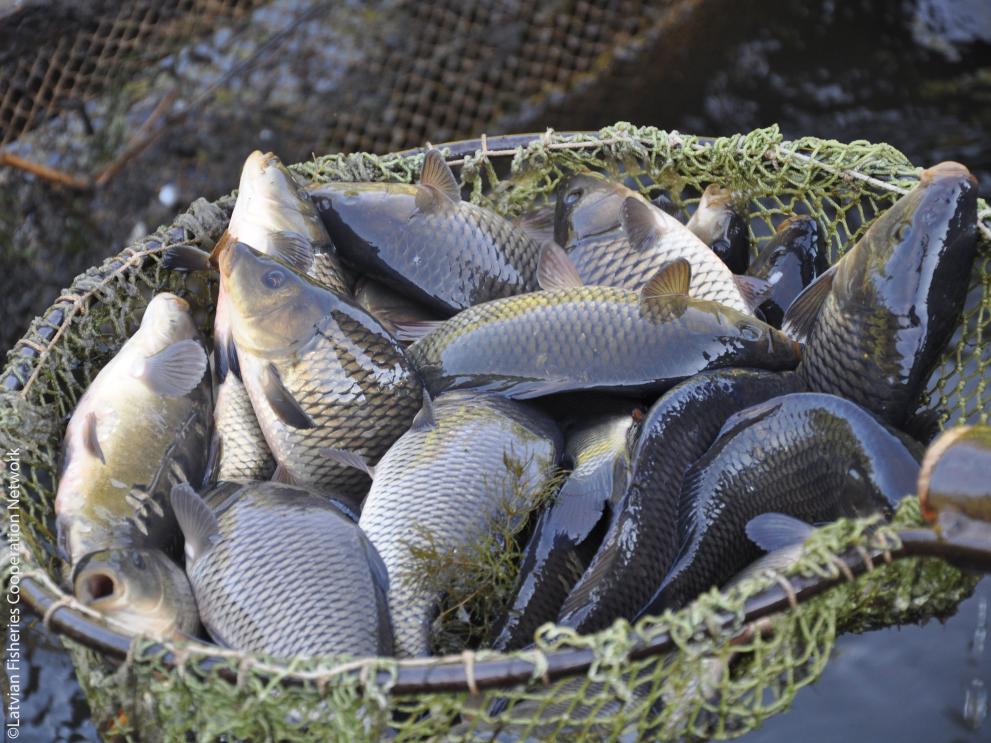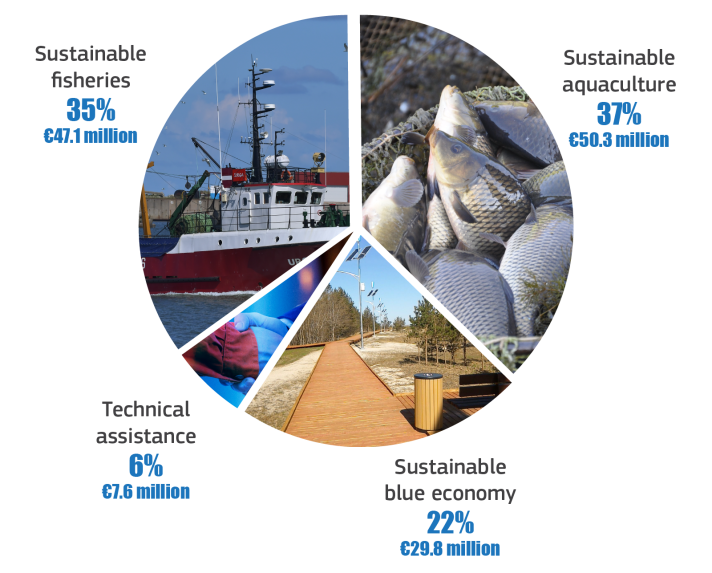
Following the adoption of the Partnership Agreement 2021-2027 with Latvia, the Commission has adopted the European Maritime, Fisheries and Aquaculture Fund (EMFAF) programme for Latvia, to implement the EU common fisheries policy (CFP) and EU policy priorities outlined in the European Green Deal. The total financial allocation for the Latvian programme for the 2021-2027 period is €192.7 million, of which the EU contribution accounts for €134.8 million.
Commissioner for Environment, Oceans and Fisheries, Virginijus Sinkevičius, said:
I am delighted to announce this new EMFAF Programme that will support sustainable investments in the fisheries and aquaculture sectors in Latvia, accelerating their green and digital transition. The programme will increase the environmental, economic and social sustainability of the fisheries and aquaculture sectors, promote innovation, protect biodiversity, foster a sustainable blue economy and the wellbeing of coastal communities.
Supported activities
35% of the programme’s allocation will be dedicated to sustainable fisheries, 37% will be invested in sustainable aquaculture and in processing and marketing, 22% will be dedicated to sustainable blue economy in coastal regions, all contributing to the EU’s environmental and climate objectives.
The programme will support, among other things:
- Sustainable fisheries: human capital and generational renewal, innovation, energy efficiency and decarbonisation, added value to fishery products, digitalisation; investments in fishing vessels to improve safety and working conditions on board; conservation of natural resources and more selective fishing activities; fisheries control and data collection.
- Sustainable aquaculture: innovation, knowledge transfer and exchange of good practices, environmental services; investments in sustainable aquaculture projects and diversification of farmed aquaculture species; energy efficiency and decarbonisation in aquaculture and the processing of fish products.
- Sustainable blue economy: development of coastal areas through Local Action Groups (LAG).
Main expected outcomes until 2027
The Latvian EMFAF programme will contribute to the EU policy priorities outlined in the European Green Deal, Farm to Fork and Biodiversity strategies.
The programme will increase the resilience of the fisheries, aquaculture and processing sectors, by supporting innovation, knowledge development and sharing through cooperation with science and collective capacity building. It also includes a support mechanism to protect the sector in case of future crises.
The programme will also drive the green transition of the sector with investments in energy efficiency, decarbonisation, climate change mitigation and adaptation through new technologies and innovation. Support will be provided to more selective fishing gear, lower environmental impact aquaculture, and implementing circular economy principles in fisheries, aquaculture and processing sectors.
The digital transition in the programme aims to improve traceability, data collection and fisheries control. The programme will support investments in digitalisation of processes, new technologies and digital solutions to enhance resource efficiency, knowledge and information exchange, and cooperation with science.
The Latvian EMFAF programme will focus also on the restoration of inland ecosystems for the continuity of rivers and natural spawning grounds, conservation of natural resources and improving the knowledge on the state of the marine environment through monitoring programmes. These projects will support the Biodiversity Strategy for 2030 and the Latvian Prioritised Action Framework objectives.
Local communities depending on fishing will benefit from Community-led local development strategies (CLLD). These strategies will support the development of entrepreneurship and diversification of economic activities including tourism, new initiatives in the blue economy including climate change adaptation and renewable energy, environmental services, promotion of cultural heritage and more active involvement of young people.
Background
The EMFAF runs from 2021 to 2027 and supports the EU common fisheries policy (CFP), the EU maritime policy and the EU agenda for international ocean governance. The fund helps achieve sustainable fisheries and conserve marine biological resources.
Article 8 of the EMFAF Regulation (EU) 2021/1139 requires Member States to produce a national implementation programme for the EMFAF. The Latvian EMFAF programme focuses on EU priorities, laying down the strategy and investment priorities, including the indicative annual financial allocation for each priority. The programme is subject to approval by the European Commission.
More information
Regulation (EU) 2021/1060 of the European Parliament and of the Council of 24 June 2021 laying down common provisions on the European Regional Development Fund, the European Social Fund Plus, the Cohesion Fund, the Just Transition Fund and the European Maritime, Fisheries and Aquaculture Fund and financial rules for those and for the Asylum, Migration and Integration Fund, the Internal Security Fund and the Instrument for Financial Support for Border Management and Visa Policy
Details
- Publication date
- 6 December 2022
- Author
- Directorate-General for Maritime Affairs and Fisheries

